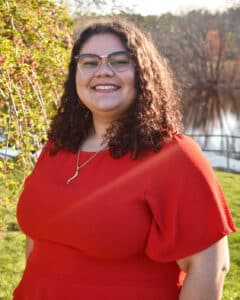Fat Liberation, Diet Culture, and Reimagining Our World
posted by Dariana Guerrero / May 14, 2021

Trigger Warnings: diet culture, shaming, fatphobia, descriptions of dieting, and disordered eating
In 1973 a group of radical fat therapists created The Fat Underground[1], a collective of fat folks radicalizing the space of therapy to focus on eating disorders, unpack fat phobia, and interrogate the health care industrial complex that so often marginalizes fat people for just being fat. Sara Golda Bracha Fishman co-founder of The Fat Underground implicates the medical field and confronts them as perpetrators of fat phobia, stating:
We [the fat underground] accused them-doctors, psychologists, and public health officials-of concealing and distorting the facts about fat that were contained in their own professional research journals. In doing so, they betrayed us and played into the hands of the multibillion dollar weight-loss industry, which exploits fear of fat and contempt toward fat people as a means to make more money.[2]
Fishman calls for transparency in the medical field, describing that the health care industrial complex has “distorted facts” about fat in order to capitalize on the vulnerable, marginalized fat body through the weight-loss industry, ultimately “exploiting” fat bodies and breeding contempt and “fear.” Fat bodies become a form of capital and buying into diet culture forces fat folk into a harmful cycle of exploitation that just results in “more money” being made by the diet industrial complex. Our approach to weight-loss and dieting has not changed much since 1973, but perhaps the most significant change is that fat folk are fighting back.
The Fat Underground penned the first (to my knowledge) Fat Liberation Manifesto[3] in 1979 demanding respect for fat people. Alluding to Karl Marx’s The Communinst Manifesto, The Fat Underground write, “WE refuse to be subjugated to the interests of our enemies. We fully intend to reclaim power over our bodies and our lives. We commit ourselves to pursue these goals together” (3). Diet culture is the “enemy” The Fat Underground chooses to admonish; and “reclaiming” our bodies–fat, skinny, tall, short is how we fight back against oppression because our “power” lies in embracing, defending, and honoring our identities. Most importantly, we have to “commit” to these goals “together.”
Solidarity among fat folk and other marginalized groups of people is the only way we, as a society, can lift ourselves out of the oppressive, corporate systems looking to do our bodies harm.
Fat writers and activists in our time are not settling for the falsehood of the BMI scale, are not settling for Oprah’s grand collaboration with Weight Watchers (now indistinctly rebranded as WW), and fat folk certainly are not settling for cowering silence. Instead, activists turn to the pen and keyboard to write not just their pain, but to expose the ideological forces that have left them marginalized and demonized.
Virgie Tovar, one of the nation’s leading experts and lecturers on fat discrimination and body image penned, You Have the Right to Remain Fat a book chronicling Tovar’s experiences with fatphobia, diet culture, and systemic oppression. In this text, she begins to define terminology pertinent to fat studies, like fatphobia, arguing:
Fatphobia is a form of bigotry that positions fat people as inferior and as objects of hatred and derision. Fatphobia targets and scapegoats fat people, but it ends up harming all people […] So, Fatphobia uses the treatment of fat people as a means of controlling the body size of all people […] people learn to fear becoming fat. They are afraid of discrimination and hatred […] We learn these things through an ongoing cultural education. (Tovar 17-18)
Tovar’s definition of fatphobia significantly characterizes it as a problem for all people. The scapegoating of fat people as perpetrators of their own problems mischaracterizes the harm diet culture has on every single person existing within a body. Tovar’s words touch upon the learning of bias–bias is something that we are taught. The subliminal messages we receive about acceptable bodies and deviant bodies start young–as children, we are told who holds most value due to representations on social media, in literature, on TV, and in film. These messages perpetuate diet culture because it is rare to see fat bodies, queer bodies, black and brown bodies portrayed at all, let alone in positive lights. For me, reading Tovar’s manifesto added to the positive representation of fat Latinx women, yet even she struggled with the demands and pressures of body image expectations.
Virgie Tovar felt the sting of diet culture in her youth, learning toxic messages because of the cultural education she, me, we, us receive as she states:
Yes, I dieted because I believed that it was only through weight loss that I could deserve to travel, wear cute clothes, and go on lots of dates with people I was hot for. But more than that, I wanted the stuff that those things represented: happiness, love, joy, and most importantly freedom. I was trying to starve my way into freedom. I was taught to believe that weight loss was the key to all of my heart’s greatest desires, but the truth is that it wasn’t. Because you can’t find self-love by walking a path paved by self-hatred (Tovar 110).
Tovar’s words speak to the narrative we have been taught in our society–being thin is to be loved, happy, joyous, and free, and we can only achieve these things once we are thin.
Instead, she challenges us to find love within ourselves and to chase freedom from oppression at all costs.
I do find optimism in Tovar’s words because while we can learn hatred and bigotry, we can also UNLEARN it. First, we need to understand where these messages come from. More often than not, oppressive frameworks we’ve learned result from capitalist, white supremacist, and patriarchal ideas that we have inherited from people before us. When we understand the oppression axis we exist in, we can then unlearn it. We can counter those oppressive ideologies by learning more about ourselves and the world concerning theories and frameworks that exist to dismantle those forces. Take critical race theory, intersectional feminist theory, queer theory, and Marxism as antithetical lenses to the oppressive ones we’ve learned. All we need to do is switch out our proverbial lenses and grab a new pair of glasses. We can entirely reinvent and re-see the world.
By daring to dream of a future without oppression, we begin to imagine systems where our bodies can live freely, dance, play and EAT without the associated codes we’ve inherited from cultures and people before us. This work of reinvention and re-visioning does not solely apply to fat liberation and diet culture because these two movements and cultures do not exist in a vacuum. Instead, our intersectional identities (race, class, gender, sexuality, ability, etc.) work in tandem to make us who we are–re-learning, re-inventing, re-visualizing the world takes the whole body, and it takes every BODY. Imagining a future void of the oppressive systems is hard, but as Tovar writes, “What if I told you that you have the right to that world?” (117). We all have a right to feel safe, valid, happy, and loved in the bodies we were born into. It is our right. It is our right. And we’re gonna fight to make it happen. The collective fight we imagine will take all of us living in bodies to dismantle these oppressive systems together.
[1] Bracha Fishman, Sarah Golda, “Life in the Fat Underground.” Radiance Magazine Online, http://www.radiancemagazine.com/issues/1998/winter_98/fat_underground.html
[2] Bracha Fishman, Sarah Golda, “Life in the Fat Underground.” Radiance Magazine Online, http://www.radiancemagazine.com/issues/1998/winter_98/fat_underground.html
[3] Freespirit, Judy, and Aldebaran. “Fat Liberation Manifesto.” Off Our Backs, vol. 9, no. 4, 1979, pp. 18–18. JSTOR, www.jstor.org/stable/25773035. Accessed 11 Dec. 2020.
 Dariana Guerrero
Dariana Guerrero
Dariana Guerrero began her journey as an artist, activist, and educator in her hometown of Lawrence, Massachusetts. After graduating from Smith College in 2017, she transitioned to teaching high school English and committed herself to creating equitable and safe spaces for underrepresented students in predominately white institutions. Her passion for fat liberation, youth education, and spoken word poetry aided her in the start of body-positive youth programming, hoping to educate and aid adolescents in their own body journeys. Outside of teaching, Dariana is a scholar and hopes to pursue her Ph.D. in English to study the relationship between fat bodies, labor, and social movements. Her work has been featured in a wide variety of publications including, Caustic Frolic Literary Journal, Exposed Brick Literary Magazine, Glass Poetry Journal, Voices and Visions, and Women: A Cultural Review to name a few. You can check out more of Dariana’s work here https://linktr.ee/Darideee.
